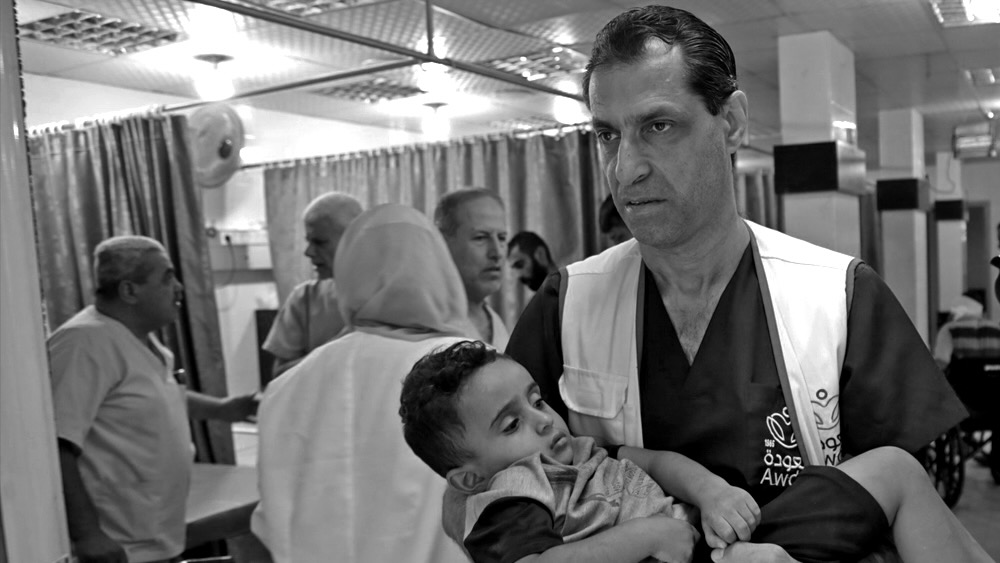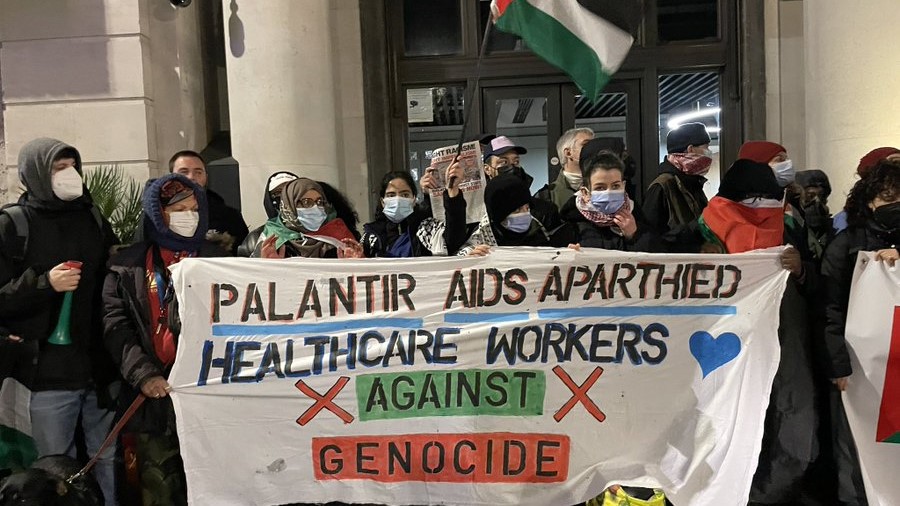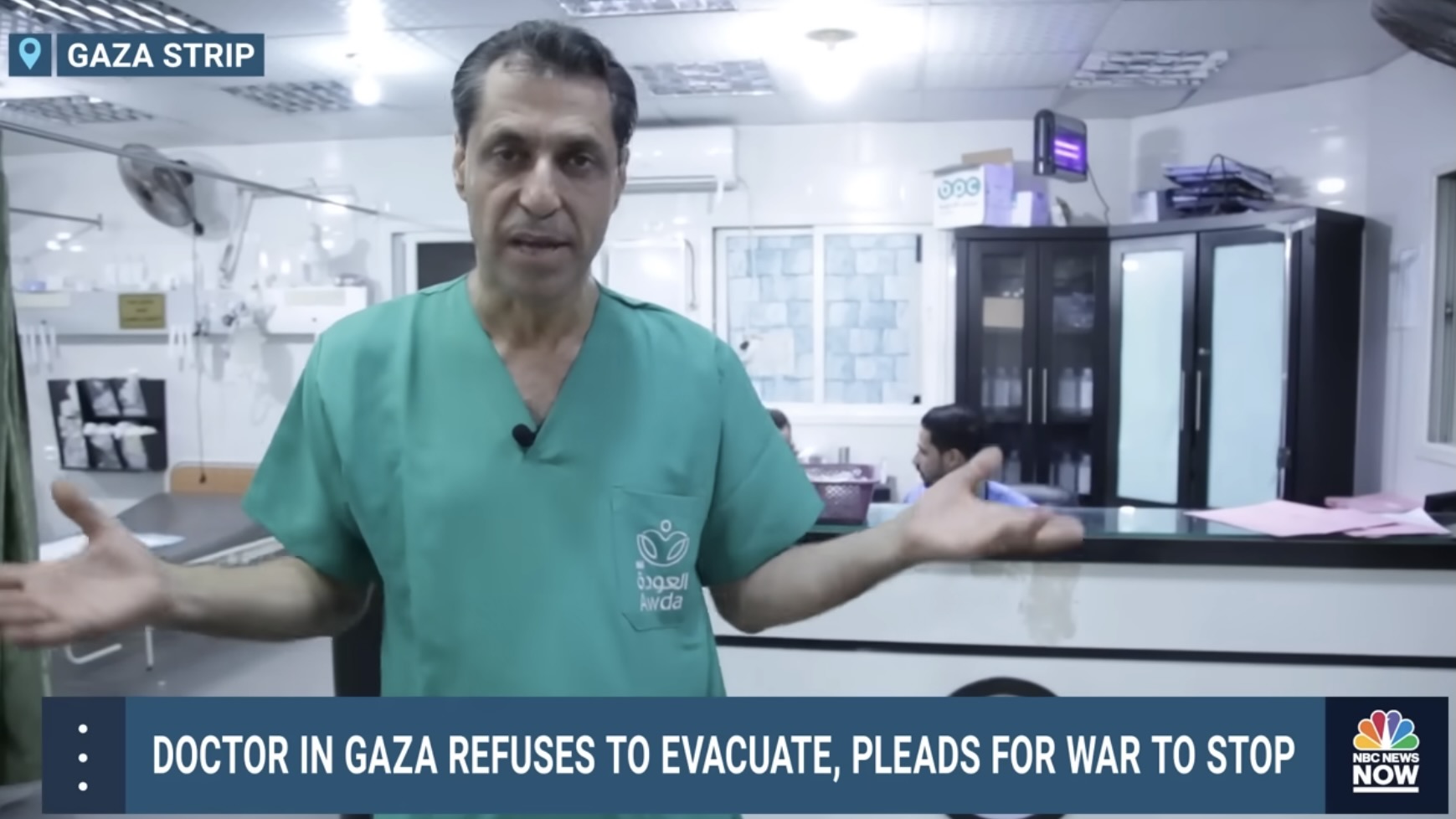Fate of Palestinian health workers kidnapped by Israeli forces remains uncertain
Original article by Ana Vračar republished from peoples dispatch under a Creative Commons Attribution-ShareAlike 4.0 (CC BY-SA) license.

The status of health workers arrested by Israeli Occupying Forces in northern Gaza remains uncertain as attacks on health infrastructure continue
One month ago, Ahmed Muhanna, the director of Al-Awda Hospital in Jabalya, northern Gaza, was detained by the Israeli Occupation Forces (IOF). According to the most recent information made available to Awda Association, the anesthetist is currently being held in Naqab prison in the Negev desert, with other details about his status remaining unknown.
Dr. Muhanna’s fate is shared by many other health workers who were arrested during the ongoing Israeli war on the Gaza Strip. Mohammed Al-Ran, a surgeon who worked at the Indonesian, Kamal Adwan, and Al-Ahli hospitals since October 7, is currently also imprisoned by the Israeli authorities, although he had been granted permission to leave for Bosnia.
Sparse information about his health conditions and location, much like that of Dr. Muhanna, is communicated through friends and relatives who have either witnessed the arrest or met Dr. Al-Ran while in prison. The IOF has remained silent unless faced with pressure, usually from abroad.
The arrest of several directors of Gaza’s hospitals has mostly been interpreted as a sign of the next phase of Israel’s attacks on healthcare in the Strip. Some, like surgeon Ghassan Abu-Sittah, predict that this will lead to a series of show trials to further the criminalization and persecution of the sector. Others, including sources close to Awda, consider it possible that the doctors will be held in prison for a prolonged period of time, with their post-war destiny unknown.
Different interpretations converge on one point, though. They all note that the health workers taken by the IOF were strong voices speaking from northern Gaza and had refused to leave the area and abandon their patients. In other words, they constituted a thorn in the side of the army that breaks international law every time it targets health infrastructure in Palestine.
While arresting and targeting health workers to silence them, Israeli soldiers continue to attack hospitals and health centers in Gaza. As a result of the ongoing attacks, many international organizations have been forced to abandon their operations for good or move to the southern regions. Among them were the Medical Aid for Palestinians (MAP) and Médecins Sans Frontières (MSF) teams.
“Drone strikes, sniper fire and bombardments in the close vicinity of the hospital made the space too unsafe to work in. The volatile conditions leave us feeling incapacitated; there’s virtually no secure space to provide even minimal medical care to people,” said Enrico Vallaperta, MSF Project Medical Referent, commenting on the organization shifting its operations from Al-Aqsa Hospital.
Yet, health workers are not giving up on protecting health infrastructure in Gaza, including in Al-Awda centers in Nuseirat and Rafah. In fact, safeguarding and reactivating the local health system remains a priority for international organizations, including the World Health Organization (WHO).
The WHO also continues to conduct visits to the remaining hospitals in Gaza. Although the situation can change in a matter of hours – with hospitals going from partially operational at 10 am to completely out of function by 2 pm – generally they are all working multiple times over their capacity as well as trying to shelter thousands of forcibly displaced people.
During a visit conducted on January 13, the WHO team found Al-Aqsa Hospital and Nasser Medical Complex short-staffed and crowded. In Al-Aqsa, there were only 12 health workers remaining, providing care to 140 people and sharing space with over 1,000 displaced people. Nasser held twice the number of patients it was supposed to accommodate. “The hospital continues to receive a high volume of trauma and burn cases but the ICU and burns unit are severely understaffed, delaying lifesaving treatment for many,” the WHO team reported back.
Read more: Israel is destroying Gaza’s food system and weaponizing food, say UN experts
Unsurprisingly, the situation continues to be ripe for the spread of communicable diseases. Before October 7, “immunization levels in Gaza were among the best globally,” according to Rana Ahmad Hajjeh from the WHO Eastern Mediterranean office. Now, without coolers and fuel to operate them, there is little hope in rolling out vaccination campaigns that could help curb major outbreaks.
Even when the WHO and other international organizations are able to get vaccines into Gaza, the IOF does not allow them to distribute them in the northern areas. Multiple missions over the past weeks had to be canceled due to the lack of security guarantees on the Israeli side. This has meant that medicines, as well as fuel needed to operate generators, are simply not where they should be.
“In the 21st century, most medical equipment operates on electricity. Unfortunately, electricity has become a scarce commodity [in Gaza],” observed Ayadil Saparbekov from WHO’s Health Emergencies program.
Amid ongoing communication blackouts, it is not only electricity that has become a scarce commodity. The same is true for information coming directly from health workers in Gaza; without that information, the fate of Dr. Muhanna, Dr. Al-Ran, and others remains difficult to predict.
Original article by Ana Vračar republished from peoples dispatch under a Creative Commons Attribution-ShareAlike 4.0 (CC BY-SA) license.

